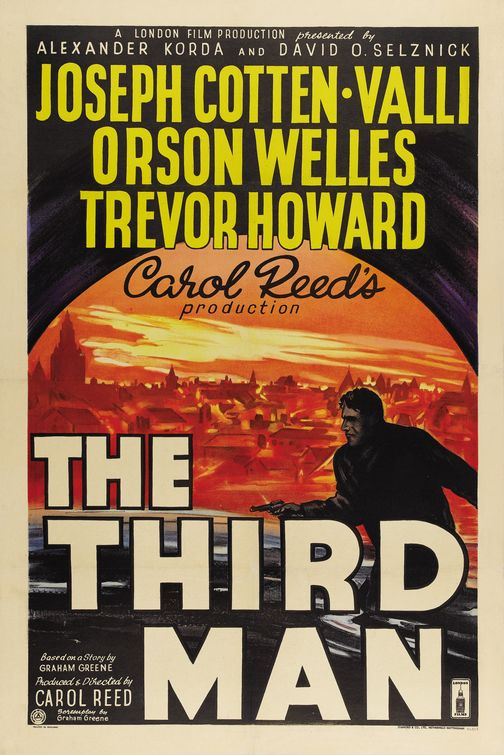 "Don't be melodramatic. Look down there. Tell me. Would you really feel any pity if one of those dots stopped moving forever?"
"Don't be melodramatic. Look down there. Tell me. Would you really feel any pity if one of those dots stopped moving forever?"Introduction
I have seen this film a fair few times - and, from what I have read, it has been incredibly influential. Inspiring the tilted camera Spike Lee uses, inspiring the entire film-noir genre, etc. I watched it as a must-see Orson Welles film. I watched Citizen Kane for the first time shortly before I watched this and Welles is simply amazing. Something about his persona and look - the cherubian, sneaky, childish look that is fascinating. Apparently he bmbed later in his career because of a certain element of arrogance on his part ... and that truly is a shame. Nevertheless, The Third Man was released eight years after the masterpiece Citizen Kane. Not that Citizen Kane did brilliantly on its initial release. Either way, Welles became exceptionally established after Kane and, hence, when he decided to take the infamous role of Harry Lime in The Third Man he had many strange requests on set and was required for only a very short while for very few scenes. Personally, Sarah's Dad told her that Joseph Cotton was the real star of Citizen Kane and in this film Cotton was the lead role ... I was in for a treat on that first viewing, but now I have seen it many more times and there are countless reasons for you to watch - and rewatch this film - that ultimately outweigh my initial reason (Cotton and Welles) to watch this film.
What I reckon ...
The entire story is initially based around Harry Lime (Orson Welles)- a recently-deceased friend of Holly Martins (Joseph Cotton) whose death, at the very start of the film, was within 'suspicious circumstances'. When he died, three people assisted and, everyone knows who two of them were - but no one knew who 'The Third Man' was. Carol Reed himself even narrates the introduction to the film, setting the scene in Vienna whereby there are four sides: German, English, Russia and America setting it after World War II, whereby Holly himself, a Westerns writer, arrived. As soon as he finds out about this mysterious 'third man', Holly decides to become detective and look into it himself and, bit by bit, he unravels the mystery to reveal that the third man was in fact Harry Lime himself setting up his own death ... the story shifts and now begins to turn into a strange film whereby Lime's true profession and criminal behaviour is revealed. This entire shift in plot happens over an hour into the film, but the reveal of Harry Lime is not only a brilliant 'twist', but a fantastic sequence utilising every unique aspect of the film to enhance the event. The sequence utilises the up-beat and relaxed music on the zither by Anton Karas (this is a brilliant soundtrack not for its memorable theme but also its effect on the film and, inevitably, the audience - it keeps you calm and makes you not take the film too seriously and enjoy the experience rather then get angry at the possibly-upsetting and dark issues it raises ... drugs, murder, etc) and the camera tilts and reveals deep, dark shadows before panning up as a sharp light, lights up Orson Welles. The man we know is Harry Lime.
It is these silhouettes that make the film fascinating, silhouettes moving in the alleys - chasing and being chased - and these are what became and are such a huge factor to the film noir genre.
As previously stated, Carol Reed himself starts the narration - as if unaware - stating 'oh, and Holly Martins' when introducing the main character. Graham Greene wrote the book and the screenplay and, having watched Brighton Rock you can see these similar themes whereby you have these amazing, complex 'bad guys' (Harry Lime and Pinkie Brown) while there are also innocent characters who are involved without planning to be (Holly Martins/Rose). So, as no doubt most people would and do, these Greene novel adaptations would be brilliant watched together.
A small subplot revolves around Harry's girlfriend Anna (Valli) who assists Holly in the search for 'The Third Man'. Anna constantly refers to Holly as 'Harry'. Holly is clearly interested in and in a timeless finale, through a deep focus, she walks from the back of the shot - in focus - walking straight past Holly who awaits her, rejecting him completely - turning Holly into this romantic victim before the credits roll. Harry's crime of changing and diluting penicillen ruined and, in effect, killed people and even in death he was ruining this part of Holly's life.
The whole film is showing these contrasts of love - love towards a friend, love towards a potential lover and how these things can change incredibly quickly. This links back to the chosen quote above - your actions hit others, repurcussions are inevitable - as inevitable as Harry being found out. The film looks stunning and the depth of each character - I've not even dipped into discussion about Trevor Howard - is fascinating. Harry is so corrupt and sinister it truly is facsinating, balance this with Welles cherubic charm and you have this incredible contrast.
I'm going to stop because I feel that there is so much more to consider and, after a little research, I could do a Part II to the review. But initially these are a fair few points to start on ... and that in itself makes The Third Man a fantastic movie.
No comments:
Post a Comment
Copyright 2008-2015. All posts & reviews are property of www.simoncolumb.wordpress.com/Simon Columb and should not be reproduced in whole, or in part, without express permission from the author.